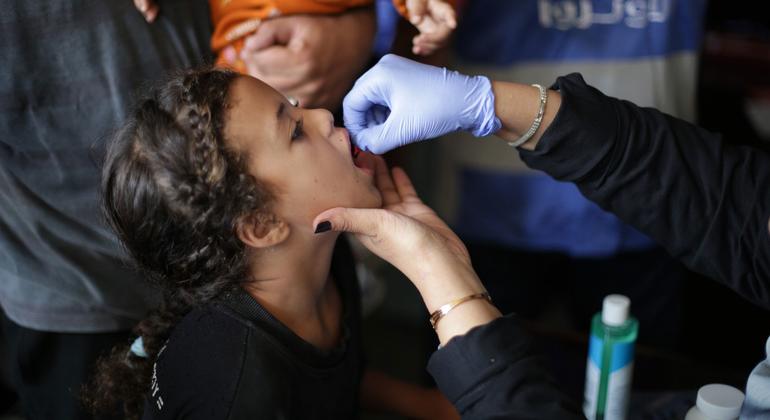Amidst the ongoing conflict in the Occupied Palestinian Territory, efforts are being made to ensure that children in the northern Gaza Strip receive the necessary polio vaccinations. Richard Peeperkorn of the World Health Organization (WHO) highlighted the importance of reaching all children in the north with the second and final dose of the polio vaccine. Despite facing challenges such as evacuation orders and bombings, the goal is to provide vaccination coverage to as many children as possible.
During a briefing via videolink for reporters at UN Headquarters, Peeperkorn noted that while they were able to cover more children than expected, there were still some who were missed due to the difficult circumstances in the region. The year-long war, combined with weeks of siege and constant displacement orders by Israel, has created delays and obstacles in the vaccination campaign.
UNRWA, the UN agency for Palestine refugees, reported that 79 percent of children in the northern Gaza Strip are now completely vaccinated against polio. However, they emphasized the need for humanitarian pauses and a lasting ceasefire in order to ensure the successful rollout of the vaccination campaign. Without these measures, children will continue to suffer and be at risk of contracting preventable diseases such as polio.
Top UN officials expressed alarm at violent incidents that occurred at sites where parents, children, and aid workers gathered for the vaccination campaign. WHO’s chief, Tedros Adhanom Ghebreyesus, expressed grave concern over reports of attacks on a health center, highlighting the dangerous conditions under which healthcare workers are operating in Gaza.
UNICEF, the UN Children’s Fund, called on Israel to investigate the recent attacks on civilians, including humanitarian workers and Gaza’s civilian facilities. Catherine Russell, the head of UNICEF, stressed the need for these attacks to stop in order to protect the vulnerable population in Gaza, especially children who are at imminent risk of disease, famine, and ongoing bombardments.
The incidents occurred during agreed upon humanitarian pauses, which were in place from 6am to 4pm during the three-day vaccination campaign. Despite the challenges posed by the conflict, efforts are being made to provide essential healthcare services to the population in Gaza. Polio, which was eradicated in Gaza 25 years ago, reappeared earlier this year, underscoring the impact of the ongoing war on the healthcare system and the well-being of the population.
The Polio Technical Committee for Gaza, which includes the Palestinian Ministry of Health, WHO, UNICEF, UNRWA, and other partners, decided to resume the vaccination campaign after it had been postponed due to security concerns. Teams were deployed across the region to administer the polio vaccine to children, despite the risks involved in providing healthcare services in a conflict zone.
Overall, the situation in Gaza remains dire, with thousands of people displaced and in need of humanitarian assistance. The international community continues to call for a ceasefire and a lasting resolution to the conflict in order to ensure the safety and well-being of the civilian population, especially children who are the most vulnerable in times of crisis.









